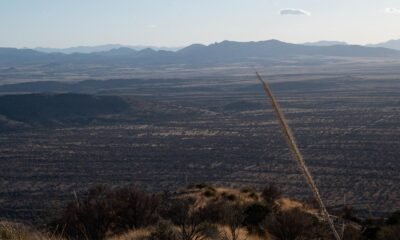DC Bureau
Biden Moves to Halt Future Offshore Drilling Across 600 Million Acres

In a significant environmental move just weeks before the end of his presidency, President Joe Biden has announced a ban on future oil and gas drilling along the entire East and West coasts, the eastern Gulf of Mexico, and parts of Alaska’s Northern Bering Sea.
Biden is set to sign two memoranda on Monday, which collectively protect over 625 million acres of ocean. This initiative is part of his broader commitment to conserve 30% of U.S. lands and waters by the year 2030, as detailed in a White House statement.
The orders are driven by requests from bipartisan leaders in coastal regions, underscoring the minimal fossil fuel potential in these areas compared to the potential environmental, health, and economic risks posed by oil and gas exploration.
“In balancing the many uses and benefits of America’s ocean, it is clear to me that the relatively minimal fossil fuel potential in the areas I am withdrawing do not justify the environmental, public health, and economic risks,” Biden stated.
Criticism emerged from the incoming administration. President-elect Donald Trump, who will assume office on January 20, argued that Biden’s approach jeopardizes the nation’s energy independence and increases consumer costs. He criticized Biden’s freeze on oil and gas leases and other environmental directives initiated during his administration.
Trump’s spokesperson, Karoline Leavitt, condemned Biden’s actions, labeling them as politically motivated. “This is a disgraceful decision designed to exact political revenge on the American people,” she remarked, expressing confidence that oil and gas production would continue under Trump’s leadership.
Biden defended the bans, emphasizing the long-term health of the U.S. economy and the importance of fishing and tourism industries. “We do not need to choose between protecting the environment and growing our economy,” he said. “Protecting America’s coasts and ocean is the right thing to do and will help communities and the economy to flourish for generations to come.”
The new protections are permanent and will prohibit any future oil and natural gas leasing in the designated areas. The ban encompasses 334 million acres along the Atlantic Ocean and Gulf of Mexico, extending from the Maine-Canada border to the southern tip of Florida.
Additionally, nearly 250 million acres of Pacific coastline, vital for marine wildlife such as seals, sea lions, and various fish species, will also be safeguarded, responding to requests from the governors of California, Oregon, and Washington. It’s noteworthy that the last federal lease sale off the mainland West Coast occurred in 1984.
Moreover, 44 million acres in the Northern Bering Sea will receive protections, a decision supported by many Alaska Native communities. The White House articulated concerns over the severe dangers that oil and gas development poses to coastal communities and the critical importance of these waters for food security and cultural preservation for over 70 coastal tribes, including the Yup’ik, Cup’ik, and Inupiaq peoples.
Last updated 5:47 a.m., Jan. 6, 2025

















